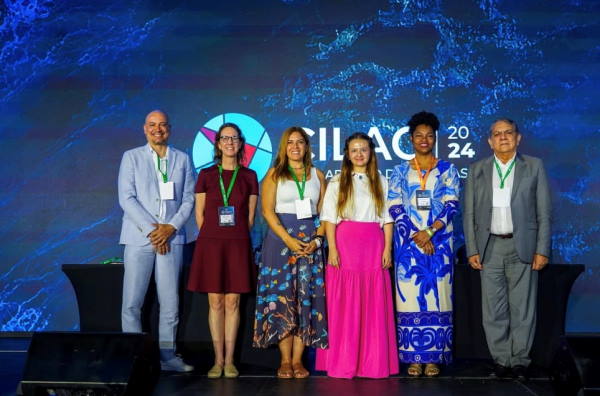 San Andrés, Colombia:--- Tadzio Bervoets, Co-Chair of the Ocean Decade Task Force for Latin America and the Caribbean, presented the Roadmap for the Implementation of the Ocean Decade Activities for Latin America and the Caribbean at the Latin America and Caribbean Open Science Forum (CILAC) 2024 last week. The event, held on San Andrés Island, featured the participation of high-level officials from the Government of Colombia and UNESCO, highlighting the significance of regional collaboration in advancing sustainable ocean initiatives. The roadmap, developed under the auspices of the Intergovernmental Oceanographic Commission of UNESCO, serves as a strategic framework to address the unique challenges faced by the region while contributing to the global vision of the UN Decade of Ocean Science for Sustainable Development: "the science we need for the ocean we want." During his presentation, Bervoets emphasized the roadmap’s focus on regional priorities such as addressing marine pollution, promoting ecosystem-based management, fostering climate-resilient ocean economies, and improving coastal resilience through nature-based solutions. Bervoets highlighted the importance of inclusivity and equity, particularly for Small Island Developing States (SIDS), which, despite their heavy dependence on marine resources, often lack the capacity to fully address the impacts of climate change and other pressing challenges. He described the roadmap as a collaborative and transformative approach to aligning regional priorities with global goals, ensuring that science is translated into actionable solutions for communities and ecosystems alike. During his remarks, Bervoets underscored the roadmap’s emphasis on fostering partnerships, mobilizing innovative financing, and building capacity across the region. He highlighted practical actions such as reducing marine pollution, conserving blue carbon ecosystems like mangroves and seagrasses, and integrating science and community input into long-term sustainable ocean plans. The roadmap also prioritizes the enhancement of coastal resilience through adaptive management strategies and the development of policies that support sustainable fisheries and marine spatial planning. The session, which also included discussions on the broader implications of the roadmap as the Ocean Decade transitions into its second half of implementation, reinforced the urgency of addressing the region’s vulnerabilities. Rising sea levels, intensifying storms, and the degradation of critical marine habitats present ongoing threats to communities and economies in Latin America and the Caribbean. Bervoets called on governments, organizations, and stakeholders to strengthen partnerships, mobilize resources, and use the roadmap as a platform for sustained action. The Latin America and Caribbean Open Science Forum (CILAC) 2024 provided a vital platform for advancing ocean science and policy, with the presence of Colombian government leaders and UNESCO officials underscoring the importance of high-level regional cooperation. Bervoets’s leadership and advocacy highlighted the pivotal role of Latin America and the Caribbean in shaping a sustainable future for oceans globally. “Our region’s challenges are significant, but so are our opportunities,” Bervoets remarked. “This roadmap is a testament to what we can achieve through collaboration and commitment. Together, we can ensure that the ocean we leave to future generations is healthier, more resilient, and better understood.”
San Andrés, Colombia:--- Tadzio Bervoets, Co-Chair of the Ocean Decade Task Force for Latin America and the Caribbean, presented the Roadmap for the Implementation of the Ocean Decade Activities for Latin America and the Caribbean at the Latin America and Caribbean Open Science Forum (CILAC) 2024 last week. The event, held on San Andrés Island, featured the participation of high-level officials from the Government of Colombia and UNESCO, highlighting the significance of regional collaboration in advancing sustainable ocean initiatives. The roadmap, developed under the auspices of the Intergovernmental Oceanographic Commission of UNESCO, serves as a strategic framework to address the unique challenges faced by the region while contributing to the global vision of the UN Decade of Ocean Science for Sustainable Development: "the science we need for the ocean we want." During his presentation, Bervoets emphasized the roadmap’s focus on regional priorities such as addressing marine pollution, promoting ecosystem-based management, fostering climate-resilient ocean economies, and improving coastal resilience through nature-based solutions. Bervoets highlighted the importance of inclusivity and equity, particularly for Small Island Developing States (SIDS), which, despite their heavy dependence on marine resources, often lack the capacity to fully address the impacts of climate change and other pressing challenges. He described the roadmap as a collaborative and transformative approach to aligning regional priorities with global goals, ensuring that science is translated into actionable solutions for communities and ecosystems alike. During his remarks, Bervoets underscored the roadmap’s emphasis on fostering partnerships, mobilizing innovative financing, and building capacity across the region. He highlighted practical actions such as reducing marine pollution, conserving blue carbon ecosystems like mangroves and seagrasses, and integrating science and community input into long-term sustainable ocean plans. The roadmap also prioritizes the enhancement of coastal resilience through adaptive management strategies and the development of policies that support sustainable fisheries and marine spatial planning. The session, which also included discussions on the broader implications of the roadmap as the Ocean Decade transitions into its second half of implementation, reinforced the urgency of addressing the region’s vulnerabilities. Rising sea levels, intensifying storms, and the degradation of critical marine habitats present ongoing threats to communities and economies in Latin America and the Caribbean. Bervoets called on governments, organizations, and stakeholders to strengthen partnerships, mobilize resources, and use the roadmap as a platform for sustained action. The Latin America and Caribbean Open Science Forum (CILAC) 2024 provided a vital platform for advancing ocean science and policy, with the presence of Colombian government leaders and UNESCO officials underscoring the importance of high-level regional cooperation. Bervoets’s leadership and advocacy highlighted the pivotal role of Latin America and the Caribbean in shaping a sustainable future for oceans globally. “Our region’s challenges are significant, but so are our opportunities,” Bervoets remarked. “This roadmap is a testament to what we can achieve through collaboration and commitment. Together, we can ensure that the ocean we leave to future generations is healthier, more resilient, and better understood.”










